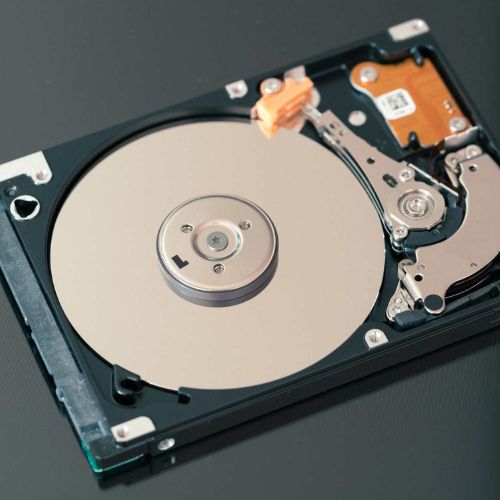Follow Us:
The Pros and Cons of SSD vs HDD: Which is Better for You?

In this article we’re going to do a proper SSD vs HDD so that you get a bigger aspect of choosing right thing for you.
Whenever we purchase our laptop, we always go for those laptops which has SSD. Because we’ve seen YouTubers say that SSD is better than HDD. But did you ever do proper research on this topic?
I guess no. So let’s get deep into this topic.
What is SSD?
An SSD is a Solid State Drive. It’s a type of storage device that holds data on interconnected flash-memory chips. Unlike a hard disk drive (HDD), there are no spinning disks in an SSD. That means data can be accessed much faster.
SSDs are commonly used in laptops, but they’re also appearing in desktop computers, servers, and high-end gaming systems. Some gaming laptops now come with two drives: an SSD for the operating system and games, and a larger HDD for media files.
What is inside an SSD?

SSDs are essentially a type of flash memory, which is a type of non-volatile memory that doesn’t need the power to retain data. Flash memory is used in a variety of devices, including USB flash drives, digital cameras, and solid state drives. SSDs, like USB flash drives, store data in flash memory chips. However, SSDs are a lot more sophisticated than USB flash drives.
Inside an SSD, there are a number of different components. The first is the controller, which is the brain of the SSD. The controller is responsible for managing the data that is being written to and read from the SSD, as well as managing the flash memory chips.
The next component is the flash memory chips themselves. These are the chips that actually store the data. SSDs typically use two types of flash memory chips: SLC (single-level cell) and MLC (multi-level cell). SLC chips store one bit of data per cell, while MLC chips store two bits of data per cell. MLC chips are slower than SLC chips, but they are also cheaper, so they are often used in cheaper SSDs.
Finally, there is the DRAM (dynamic random access memory) chip. This chip is used to store data that the SSD needs to access quickly. The DRAM chip is faster than the flash memory chips, but it is also more expensive.
SSDs are a newer technology that offers a number of advantages over regular hard drives. They are much faster, more
durable, and use less power. If you are looking for a high-performance storage option for your laptop or computer, an SSD is a great option to consider.
What is HDD?
HDD stands for “Hard disk drive”. It is a data storage device used in computers and other electronic devices. The HDD is a non-volatile storage device, which means that it stores data even when the power is turned off. It consists of one or more spinning disks, called platters, that are coated with magnetic material. The platters are mounted on a spindle that spins at a high speed. Data is written to and read from the HDD by a read/write head that is mounted on an arm that moves across the surface of the platters.
The capacity of an HDD is measured in gigabytes (GB) or terabytes (TB). One GB is equal to one billion bytes, and one TB is equal to one trillion bytes. The first HDDs were introduced in the 1950s, and they have undergone a number of changes over the years. Today, HDDs are available in a variety of sizes and form factors, and they are used in a wide range of devices, including desktop computers, laptop computers, servers, and storage arrays.
What is inside an HDD?

Each HDD(“Hard disk drive”) has one or more spinning disks, also called platters, that store data. The platters are made of a material, usually glass or aluminium, that is coated with a magnetic substance. Data is written to the disk by a read/write head that moves across the disk as it spins.
HDDs are able to store large amounts of data, and they are often used to store operating systems, applications, and user data. HDDs are typically faster than other types of storage devices, such as solid-state drives (SSDs), which also use spinning disks.
The capacity of an HDD is measured in gigabytes (GB) or terabytes (TB). One GB is equal to one billion bytes, and one TB is equal to one trillion bytes.
Comparing SSD and HDD:
Now, as we’ve got the ideas about SSD and HDD, we’ll be comparing both of them in terms of every aspect. There is no doubt that SSD is better than HDD. But “why is that and in which aspects“, that thing we’re going to know in this part.
SSD vs HDD: Speed & reliability
The cloud is great for storing data, but what about speed and reliability? For many users, the answer is a solid-state drive (SSD). An SSD is much faster than a traditional hard disk drive (HDD), which means shorter boot times, quicker file transfers, and snappier overall performance. Cloud storage is great for files you don’t need immediate access to, but an SSD is ideal for your operating system and most-used programs. SSDs can boot up your computer and launch apps much faster than HDDs. They also load and save files faster.
The speed of an SSD is due to the way they are designed. SSDs have no moving parts. This means there is no need to wait for the disk to spin up to speed. The data is stored on interconnected flash memory chips.
Whereas HDDs store data on spinning disks. The data is accessed by a read/write head that moves back and forth across the disk. This movement can take time, which can slow down your computer.
That’s why SSDs are also more reliable than HDDs. HDDs are susceptible to shaking and dropping. They can also be damaged by heat and magnets. SSDs are not affected by these things.
SSDs even use less power than HDDs. This is mainly because they have no moving parts. This can result in longer battery life for laptops and other devices that use SSDs.
So, in terms of speed and reliability SSD wins the competition.
SSD vs HDD: Cost and Capacity
The cost of SSDs has come down over the years, making them more affordable for consumers. The price of a 1TB SSD is now around $200. The price of a 1TB HDD is around $50. The cost of an SSD is still higher than an HDD, but the price difference is not as significant as it once was. The price of SSDs is expected to continue to drop in the future.
But if we put aside the fact that the cost will drop, at the present time the cost of an SSD is really high, but at the same time, the capacity of SSDs is also lower than HDDs. The largest SSDs are only 2TB. The largest HDDs are 16TB.
So, it is obvious that if you want to make a computer with a huge storage capacity, then HDD could be a better option for you rather than buying an SSD.
Now, you might say that you want speed, reliability and capacity at minimum cost. So, this is indeed a problem. To solve this problem, what companies do now, the gives you two types of disks in a single PC(in the case of a laptop). So, you can have SSD and HDD on your PC. What it will do is, that the SSD part will be responsible for increasing the speed of your computer and the HDD part will store more data. And in the case of desktop, the assembling option is there. So you can assemble a Solid state drive and an HDD of any capacity you want easily. So, on the desktop, it is not an issue.
Even though, in terms of “cost vs capacity“, HDD makes a clear win.
Security and Data Recovery

Data security and recovery are important considerations for any storage device. There are a variety of ways to approach data security, from encrypting data to using physically secure devices. Data recovery is also important, especially if data is lost or corrupted. There are a variety of ways to approach data recovery, from using backup systems to using data recovery software. Now let’s see which type of storage device can provide you with better data security and recovery feature.
HDD vs SSD: Security
When it comes to security, HDD is the clear winner. HDD is more difficult to hack since it uses physical spinning disks that are harder to access than the flash memory used in SSDs. In addition, HDD is more resistant to physical damage, which means that your data is less likely to be lost or corrupted if your HDD is damaged.
HDD vs SSD: Data Recovery
HDD is also the better choice for data recovery. If your HDD is damaged, you can often recover your data by using specialized software or sending it to a data recovery service. On the other hand, SSD is more likely to lose data permanently if it is damaged, due to the way it stores data on its flash memory.
So, which is the better choice for you? It depends on your needs. If security is your main concern, then HDD is the better choice. If you need to store large amounts of data or you’re worried about data loss, then SSD is the better choice.
Now, we’ve done with the comparison. But here comes the real question-
Which one you should buy between SSD and HDD?
The debate between Solid state Drive and Hard disk Drive has been around for some time. Some people swear by SSD, while others are adamant that HDD is the way to go. So, which one should you buy?
There are a few things to consider when making your decision.
- First, think about what you will be using your computer for. If you are a heavy user of applications that require a lot of speed along with storage, then an SSD is a good choice. However, if you only use your computer for basic tasks, then an HDD will suffice.
- Second, consider your budget. SSDs are more expensive than HDDs, so if you are on a tight budget, then an HDD is the way to go.
- Third, think about the size of your computer. If you have a desktop computer, then an HDD is a good choice. However, if you have a laptop, then an SSD is a better choice. Although nowadays, it is preferable to use both of them to get better result, if you can afford them.
- Finally, think about the future. SSDs are becoming more popular and are slowly becoming the standard. So, if you think you will be using your computer for a long time, then an SSD is a good choice.
In the end, the decision between SSD and HDD comes down to personal preference. Consider what you will be using your computer for and how much you are willing to spend.
I hope this blog was helpful to you and you got a better exposure on SSD vs HDD.

